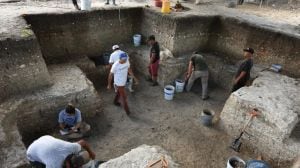Muscle flexing
Shortly before parliamentary elections in December, foremen fanned out across the sprawling GAZ vehicle factory in Nizhny Novgorod...

Shortly before parliamentary elections in December, foremen fanned out across the sprawling GAZ vehicle factory in Nizhny Novgorod, 250 miles east of Moscow, pulling aside assembly-line workers and giving them an order: vote for President Vladimir V. Putin’s party or else. They were instructed to phone in after they left their polling places. Names would be tallied, defiance punished.
The city’s children, too, were pressed into service. At schools, teachers gave them pamphlets promoting ‘Putin’s Plan’ and told them to lobby their parents. Some were threatened with bad grades if they failed to attend ‘children’s referendums’ at polling places, a ploy to ensure that their parents would show up and vote for the ruling party, known as United Russia.
Around the same time, volunteers for an opposition party, the Union of Right Forces, received hundreds of calls at all hours, warning them to stop working for their candidates. Otherwise, you will be hurt, the callers said, along with the rest of your family.
Over the past eight years, in the name of reviving Russia after the tumult of the 1990s, Putin has waged an unforgiving campaign to clamp down on democracy and extend control over the government and much of the economy. He has suppressed the independent news media, nationalised important industries, smothered the political opposition and deployed the security services to carry out the Kremlin’s wishes.
While these tactics have been widely recognised, they have been especially heavy-handed at the local level, in far-flung places like Nizhny Novgorod. On the eve of the March 2 presidential election that was all but fixed in December, when Putin selected his close aide, Dmitri A. Medvedev, as his successor, Nizhny Novgorod stands as a stark example of how Putin and his followers have established what is essentially a one-party state.
Putin’s Russia is not the Soviet Union. For most Russians, life is freer now than it was in the old days. Criticism of the Kremlin is tolerated, as long as it is not done in an organised way, and access to the Internet is unfettered.
Still, as was revealed in dozens of interviews with political leaders, officials and residents of Nizhny Novgorod over several weeks, a new autocracy now governs Russia.
The government has closed newspapers in St. Petersburg and raided political party offices in Siberia. In this region on the Volga River, Putin’s allies control nearly all the offices, and elections have become a formality. And that is just as it should be, they said.
A refrain often heard across Russia is that the distressing years right after communism’s collapse left people craving stability and a sturdy economy far more than Western-style democracy. These days, they care little if elections are basically uncontested as long as a strong leader is in charge. “There is some hope for us now,” said Nina Aksyonova, 68, a Nizhny Novgorod resident, explaining Putin’s popularity.
In Nizhny Novgorod, an industrial centre with 1.3 million residents, authority flows from the Kremlin to a regional governor appointed by Putin, who abolished the election of governors in Russia in 2004. The governor, Valery P. Shantsev, was brought in from Moscow and is charged with ensuring that Putin’s party, United Russia, wins elections.
Boris Y. Nemtsov became a political star in Russia and the West as governor of Nizhny Novgorod and deputy prime minister in the 1990s, but in recent months he and his opposition party have taken a battering here. Regional and national television stations, controlled by the Kremlin and its surrogates, have repeatedly attacked him—calling him everything from a corrupt bureaucrat to a traitor.
“His career has been accompanied by scandals,” went a typical report on the popular Channel One right before the December elections. “It was the elderly who were the first to feel the results of the work of Nemtsov’s government on their purses. Pensions dropped to the lowest level in all Russia’s history. Boris Nemtsov used to gather the press just to say that he did not care who the pensioners, deprived of money, would vote for,”
Meanwhile, a different kind of propaganda war was being waged on the streets. Russia has relatively conservative attitudes toward homosexuality, and all autumn long Nizhny Novgorod was blanketed with tens of thousands of leaflets saying that Nemtsov’s liberal, pro-Western opposition party, the Union of Right Forces, ardently favoured gay rights and employed canvassers with AIDS. Neither was true.
Intimidation and violence came next. Businesses cut off donations after receiving threats from government officials, said Sergei Veltishchev, an organizer for the Union of Right Forces. The party was refused advertising space on everything from billboards to newspapers to television.
A few weeks before the elections, Nemtsov gave up, renouncing his party at a news conference. The party’s remaining candidates in the region were too fearful to campaign. That left Putin’s United Russia unchallenged.






- 01
- 02
- 03
- 04
- 05

























